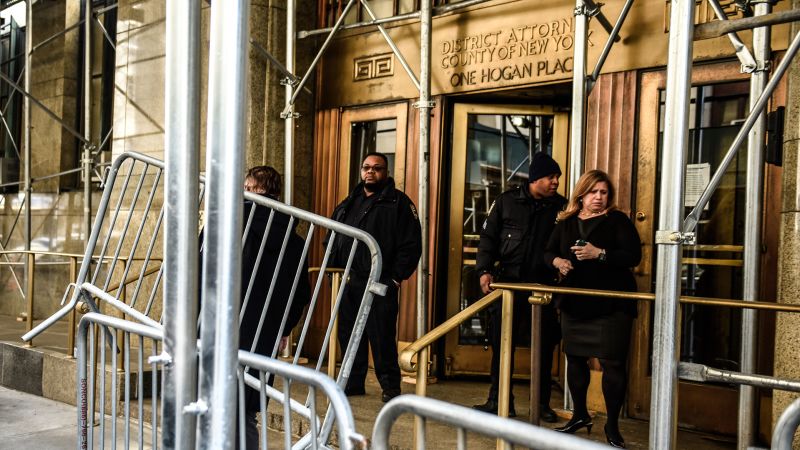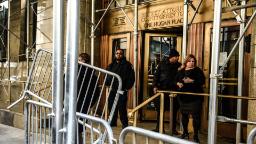

CNN takes a closer look at the legal drama surrounding Donald Trump. Watch “CNN Primetime: Inside the Trump Investigations” Tuesday, March 21 at 9 p.m. ET.
CNN
—
While the country anticipates the first-ever indictment of a former president – assuming Manhattan District Attorney Alvin Bragg charges Donald Trump with a crime – it’s worth looking at the mechanics of what’s going on in the legal system and how the process that applies to everyone is being applied to Trump.
It’s hard enough to keep track of all the cases involving Trump:
- Bragg is looking at a payment back in 2016 to adult-film actress Stormy Daniels.
- Fulton County prosecutors in Georgia are looking at Trump’s effort to overturn the 2020 election results there.
- A Department of Justice special counsel is looking at both the election meddling and his treatment of classified documents.
One thing that ties all those investigations together – regarding hush money, election meddling and the documents – is that all three have been or are being presented to a grand jury.
You’ll recall the foreperson for the special grand jury in Georgia spoke to CNN and other news outlets last month. She drew some criticism from legal watchers that she publicly discussed the broad outlines of evidence – but also made clear that it is a grand jury of regular people who must agree with prosecutors that there is enough evidence to bring a case.
The old adage, meant to expose the one-sided grand jury portion of the judicial process, is that a prosecutor could get a grand jury to “indict a ham sandwich.” It’s just that easy.
That turn of phrase has long been attributed, perhaps inaccurately, to the former chief judge of New York’s Court of Appeals, Sol Wachtler. If you’re watching the coverage of a possible Trump indictment, trust me, someone will repeat the phrase.
A critic of the grand jury process, Wachtler wanted the state to scrap the system. He was clearly unsuccessful.
I reached out to Elie Honig, a CNN legal analyst, former federal prosecutor and author of the new book, “Untouchable: How Powerful People Get Away With It,” for a refresher on how grand juries and indictments work. Our conversation, conducted by phone, is below.
WOLF: What should we know about the difference between a grand jury and a trial jury?
HONIG: A grand jury decides to indict, meaning to charge a case. A trial jury determines guilt or non-guilt.
A grand jury is bigger, typically 23 members, and the prosecutor only needs the votes of a majority of a grand jury – as opposed to a trial jury, which has to be unanimous.
The standard of proof in a grand jury is lower than a trial jury. In a grand jury, you only have to show probable cause, meaning more likely than not. But of course in a trial setting, you need to show proof beyond a reasonable doubt.
The other thing to know is a grand jury is an almost entirely one-sided process.
Usually the only people allowed in the room at all are the grand jurors, the prosecutors, the witnesses and a court reporter.
In some instances, including New York, there’s a limited right of a potential defendant to present some evidence, but no defense lawyers are allowed in the room.
There’s no cross-examination of the prosecution’s evidence. There’s no presentation of defense evidence.
Close to every time a prosecutor seeks an indictment from a grand jury, he or she will get an indictment from the grand jury.
WOLF: How would you define “indictment”?
HONIG: It’s a document setting forth formal charges against the defendant.
WOLF: We have three grand juries that are top of mind – for election meddling in Georgia, at the federal level for declassified documents and then the Manhattan DA. How much variation is there in grand juries between city, county and federal?
HONIG: There are minor variations, but the basics remain the same.
Here’s an example of one of the minor variations in New York State, but not in the federal system, meaning for DOJ. The defendant does have some limited right to be notified and given a chance to testify or present defense evidence, which we saw play out over the last week with Trump and then him asking Robert Costello to testify.
That’s not the case federally. You do not have to give a defendant a chance to testify or present evidence. That’s one slight variation. But the basic fundamentals are the same.
WOLF: All of these cases have been going on, at some level, literally for years. So we have this coincidence of them potentially coming to a head at the same time. That is going to feed the “witch hunt” narrative that Trump pushes.
HONIG: Especially given that all three investigations have been pending for years. January 6 has been pending for two-and-change years. Mar-a-Lago is going on about two years. Fulton County is two-plus years, and the hush money is six-and-a-half years.
I think the argument will be, when you have three or four different investigations, all of which have been outstanding for multiple years – if they all culminate within a fairly brief stretch as we head into the 2024 election, as multiple people, including Donald Trump, have declared their candidacies.
You’re just naturally subjected to that type of criticism, that they’re targeting a candidate, perhaps a front-runner, of the other party.
WOLF: What do you make of that?
HONIG: I’ve been critical of all three investigations for moving too slowly. I don’t assume the worst. I don’t assume that that’s being done intentionally to get it as close to the election as possible.
I think the more likely scenario is just they’re moving too slow. They’re too myopic and bureaucratic in their approach. That’s what I’ve said publicly about (Attorney General Merrick) Garland and (Fulton County District Attorney) Fani Willis for sure.
WOLF: And now we have a sort of deadline because the election is happening.
HONIG: It’s not a formal deadline. But it is a widely observed practice that you don’t want to take an overt dramatic step like drop an indictment or hold a trial close to an election.
With DOJ, it’s a 60-day rule, or sometimes it’s understood as a 90-day rule. I think it’s unlikely that a judge would force Donald Trump and/or prosecutors to try a case, let’s say in the summer of 2024, with the presidential election just around the corner.
